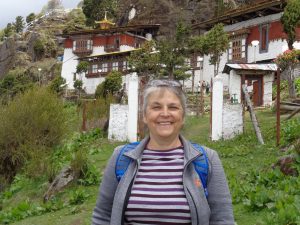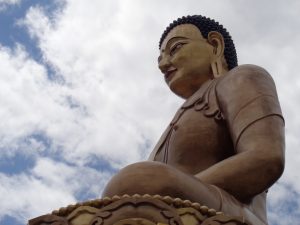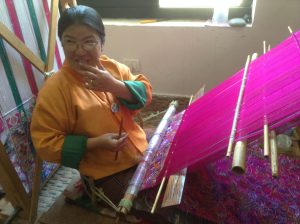Written by: Barbara Waldorf, BSN, MPH
There are various threads of my life that weave together, influencing each other in different ways over time. Nursing is one of those threads, global health is another, and meditation is a third. I have spent a significant portion of my time and energy, training in each of these disciplines. And family is another thread that underpins it all. In thinking of writing about my experience in Bhutan last year, the tapestry of all those threads comes together.
There is always the question when traveling; “What does this mean for my life back home? What am I learning that is relevant to my day to day world?” My experience in Bhutan and Nepal last year had an impact, but I didn’t really see it clearly until I needed it. Push came to proverbial shove. This is where global health and life back home intersect, which is a something that I (and many of my friends) have been contemplating for years.
I went to Bhutan on pilgrimage, not to do nursing, but because of connections from BUSPH. I was lucky enough to meet with the former head of the their nursing school and talk about the status of nursing, the education and working lives of nurses in Bhutan. It was wonderful and very enlightening. She was very generous in describing the various challenges that nurses and public health providers face in this developing country. I appreciated being able to hear her perspective, and contrast it with my encounters with nurses in Nepal and India. The struggles of nurses to gain education, recognition and acknowledgement is not essentially different, although some of the issues of being in a developing country make this more difficult. It reminded me to be grateful for the opportunities I have had.
Something that really struck me about being in Bhutan was the emphasis on compassion and the support of practice. This is woven into the culture, like the extraordinary weavings that make up the cloth for traditional clothing that is still worn. It all felt very natural, being in this environment, so it wasn’t until I was back home that the connections began to be made. The intersections between the experiences in Bhutan and my studies in compassion meditation came to fruition in my response to caring for my stepfather when he became ill this fall.
I had been unsuccessfully trying to get my mother and stepfather (who are in their late 80’s) to move to senior living for a long time. During this time they have had various medical issues, started to become somewhat stressed and forgetful, and had an increasingly difficult time keeping their practical lives together. But they did not want to go, despite the logic of it and recommendations by friends. I was told, “We are not going to move until something really bad happens.”
This fall, it happened. I sat across the kitchen table from my stepfather. Convinced he was dying, he asked for my help. In that moment, all my training; my 30 years of nursing, public health and Buddhist practice came together. Here was a human being who was suffering. It didn’t matter that we had spent the previous two years arguing and then not speaking to each other. It didn’t matter that we didn’t agree about politics, social mores or many other things. This was a human being that needed care and I was capable of providing it. So I did. I spent the next month going to doctor, giving him meds 5 x per day, taking him to the hospital, doing the post op care; and then finding an assisted living and helping him and my mother move.
This was compassion in action. I didn’t feel compassionate, it was all in the activity. There was no difference between doing meditation practice and setting out pills, giving eye drops or organizing the clearing out of a house they had lived in for 40 years.
What does this have to do with global health? Everything global is local, and everything local starts with family. Anyone’s family, yours, mine, or theirs, is a basic organization of how humanity provides care for each other. No matter how far we go, we can only care for people as we connect to them – as part of a greater family of humanity. So, my trip to Bhutan brought me home (in many ways) to a depth of compassion and gave me the space to think and feel into what it means to be compassionate and provide care for those closest to me.


